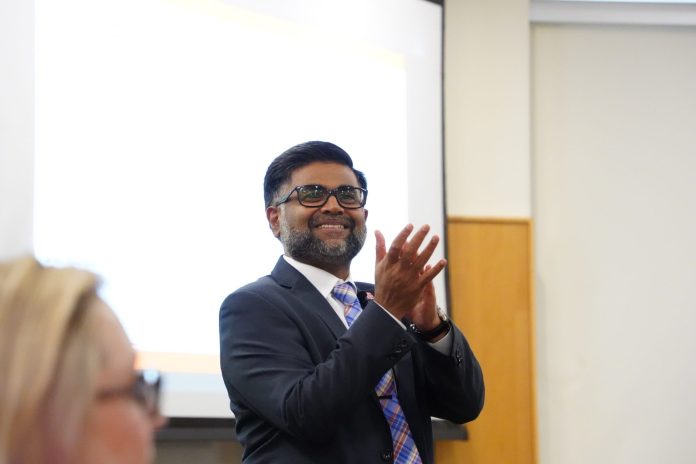
Having served in a number of interim posts at University of Texas Permian Basin over the years, Rajalingam “Raj” Dakshinamurthy has found a home as Provost and Senior Vice President of Academic Affairs.
A bioanalytical chemist by training, Dakshinamurthy has been at UTPB for about three and a half years. As Provost, Dakshinamurthy will serve as the Chief Academic Officer, the second executive in charge at the university leading the five academic colleges which have upwards of 70 undergraduate and graduate degree programs and certificates.
Because he had been interim for seven months, he didn’t see much difference being officially named to the post.
“My predecessors were very generous. They let me into this office and let me ask tough questions to them,” Dakshinamurthy said. “I try to be honest and transparent and amicable. I’m a person who is available for any type of conversation at any time.”
He noted that this helped him learn what was going on in that office and the structure needed to support the university’s goals and mission.
“Collectively, my own experience and previous experience running the research office and grad studies, working closely with the previous provost under the leadership of President Woodley … I don’t feel any change in what I’m doing. I’m feeling more rewarded when I get things done. We’re getting so many things done … That gives me my motivation to get up every day and come to work here because of that energy and enthusiasm, what’s going on here on the fourth floor” of UTPB, Dakshinamurthy said.
Serving as interim head of several departments during his time at UTPB will help him internally and has helped him establish relationships outside of the university such as with Odessa College and Midland College.
He noted that the academic office needs to have a plan for growth, the programs they are going to offer and how they are going to reach the university’s goals.
“The plan next year is to have a committee explore the possibility of setting an academic affairs strategic plan in alignment with the pillars and then seek the approval of the president,” Dakshinamurthy said.
The pillars are enrollment, student success, research and innovation and community service.
“That will kind of help us to set the tone moving forward,” he added.
Dakshinamurthy has served as Associate Vice President for Research and dean of graduate studies.
“I’m able to leverage my previous experience working across campus because the research and graduate education required the coordination and support of every program stakeholders. That helped me work with many of them since the time I arrived. When I became an interim dean, that experience helped me to rework my relationships to get a few things done in the College of Arts and Sciences with them during my tenure as interim dean,” Dakshinamurthy said.
Last January, he also started serving as interim dean for the College of Health Science. He does have the experience and educational background for that as well.
“My undergraduate and master’s degree is in chemistry, but my PhD is in cell biology, so I can be tenured in chemistry and biology. I kind of dance around between two departments,” Dakshinamurthy said.

He served as interim provost last summer and was appointed provost and senior vice president in late 2023. The job is a great opportunity.
“I have a excellent institutional knowledge and memory by working with every one of our colleagues … That is going to be handy for me now. By working with my predecessors in this office closely, I learned the gaps in where we are and what we are supposed to do to meet our university mission and goals the president set … which is to double the degrees we award. That’s easy to say that you just need to double the degrees, but you have to do a million things to double the degrees,” Dakshinamurthy said.
He added that each team member knows their role.
“I’m the last piece to join the puzzle to support the president and the university to reach the target. As you can see the graduate enrollment is steadily growing. Our current expenditures are steadily growing in the last three years, particularly our research expenditures doubled. Our faculty members are writing more grants. We are bringing more grant dollars around students, particularly for student success activity. Those are some of the outcomes from the initiative me and the President and others work together from the Office of Research and Sponsored Programs, as well as from grad studies,” Dakshinamurthy said.
Over the past 10 years, Dakshinamurthy served in various administrative roles, including vice president for research, Academic dean, Graduate dean, Executive director of research and sponsored program, graduate program director, and assistant department chair. He earned a bachelor’s degree and a dual master’s of science and philosophy in chemistry from St. Joseph’s College in India. He earned his Ph.D. in biochemistry and structural biology from the University of Arkansas. He has been recognized several times for excellence in teaching, research, and professional service, a news release said.
He is a bioanalytical chemist by training, spending his professional career researching protein structure and function, drug discovery, and biological nanomaterials. As a researcher, he published over 40 publications in high-impact journals and 350 research presentations related to the field of biomedical sciences. Additionally, he secured a patent for synthesizing gold nanoparticles capped with drugs. As an investigator, he received more than $10 million in external grants. He’s served as a faculty member at two different institutions and served on several professional organizations.
When he interviewed at UTPB in 2019, it snowed so he was stuck here for a few days.
The search committee chair felt bad about his limited mobility so he took Dakshinamurthy to Rosa’s Cafe on Faudree Road. There they met UTPB President Sandra Woodley and her husband who were having dinner.
Dakshinamurthy said Woodley interviewed him for about 30 minutes at Rosa’s.
They talked about what he had done at previous institutions and the experience and skill set he would bring to UTPB.
He wanted to be part of the enthusiasm, energy and ambitious agenda at the university.
“Whenever you have an ambitious leader, you are going to succeed. My Ph.D. and my postdoctoral experience, my own professional experience is an example of that … Every time I aligned with appropriate team leaders, Ph.D. advisor, or postdoctoral advisor, or my department chair, or my dean when I was a junior faculty member did the same thing. They set that ambitious agenda,” Dakshinamurthy said.
He acknowledged that it causes a bit of anxiety when someone says they want to double the diplomas to 3,000 by 2030.
“If we set the goal, then it’s here to help us accomplish a lot. If we don’t have a goal, then it won’t create the energy around the system. The President did a phenomenal job in the last six years. (It’s) day and night at UTPB. You can talk to many people; the things we have accomplished in many, many areas. Because many of the areas in which we do projects is bottom up,” Dakshinamurthy said.
People who head the departments bring structure to them, work across departments and work with stakeholders.
“We are not afraid (of) challenges and that’s what I have learned from the President. I appreciate that opportunity she gave me to work here,” he added.
Dakshinamurthy said UTPB has a critical role to play in the community along with partners like community colleges and others.
“We have a committed community here in West Texas. They all have a vested interest in UTPB being successful as a university. It’s a good combination to have. We have internal stakeholders and external stakeholders coming together and see the value of a university in a region like this. It’s a critical piece and I’m pleased to be part of it under the leadership of President Woodley and all my other executive team members,” Dakshinamurthy said.
Woodley said in a news release they look forward to him serving in this role.
“His commitment to our academic excellence at UTPB is inspiring. Our students, faculty, and staff will benefit from his leadership, experience, and passion for student success,” Woodley said. “Since arriving at UTPB more than three years ago, Dr. Dakshinamurthy has continued to display a commitment to our academic success and the critical role our faculty and staff play in those objectives—a key attribute that will serve him and the university moving forward in his new position.”



